Blogs
Practical Insights & Latest Happenings
Don’t miss out on the latest trends and info on SEO, search engines, social media, and more.
October 12, 2023
mothasim
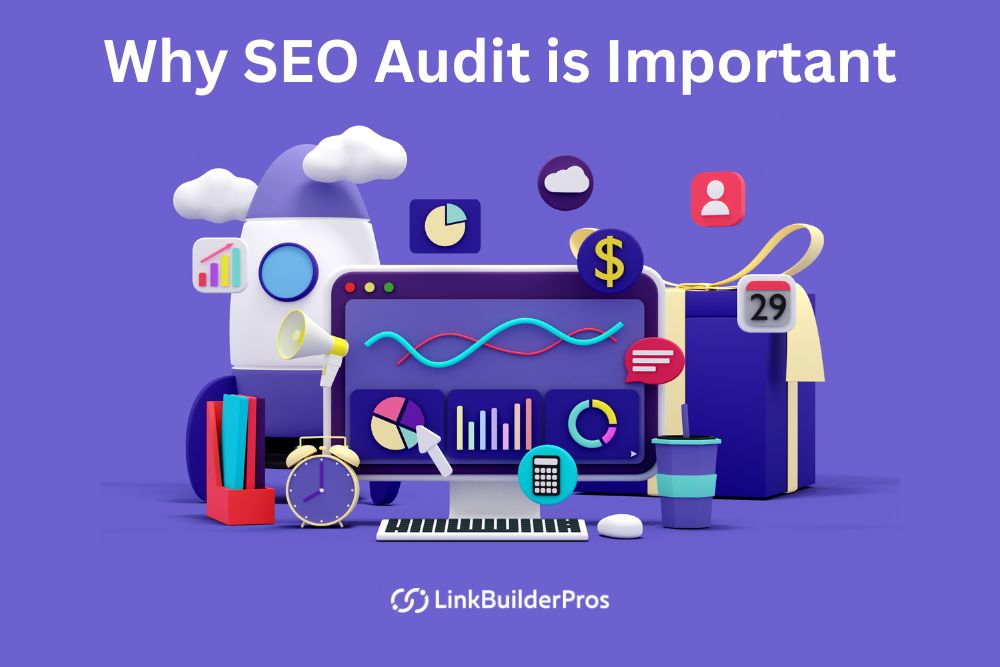
Let’s say you have a website. It could be a business website, a blog, an ecommerce store, or anything else in general. You have already invested some time and money in web development, content, and SEO.
Some time has passed since you’ve been running an SEO campaign but you’re nowhere near your goal. None or very few of your keywords are ranking while your website is full of technical issues. What to do to get back on track and drive traffic to your site?
The first step is to do a thorough SEO audit and find all kinds of problems that your website currently has. There should be a detailed plan on how and when to solve every issue. A good SEO audit agency also provides recommendations on how to optimize the website and boost your ranking.
Let’s dig deeper and know more about the importance of an SEO audit for your online presence.
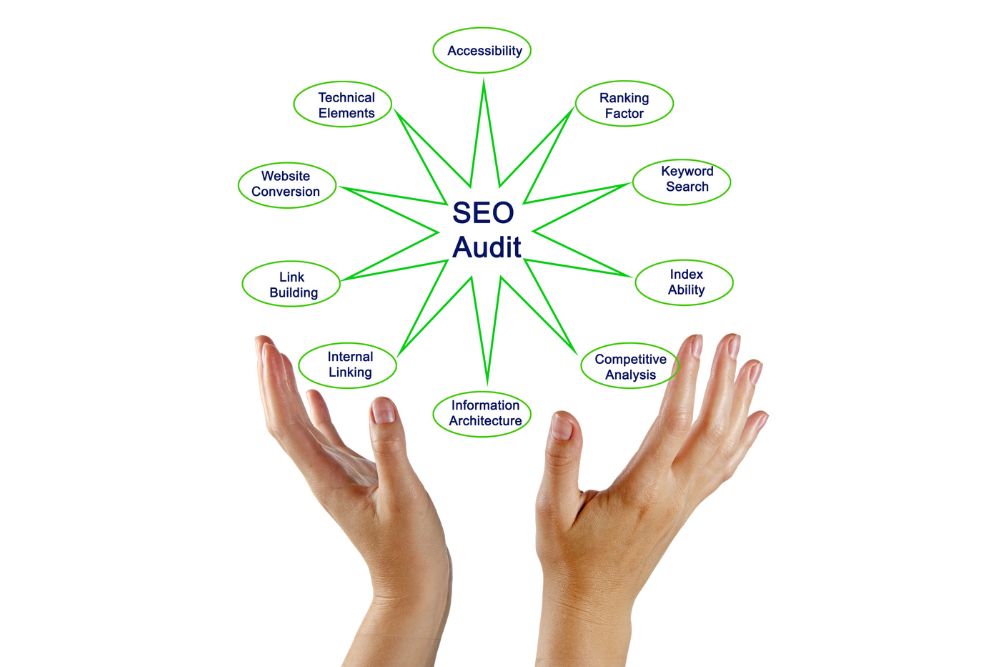
In simple terms, an SEO audit is like checking your website to see if it’s healthy and doing well on the internet. It helps find problems that might be stopping your site from showing up on top search engine results. You can think of it as a doctor’s checkup for your website to make sure it’s in good shape so people can easily find and visit it and then have a great user experience.
With a comprehensive audit, you can inspect different aspects of your website such as user experience (UX), crawlability and indexing, keyword analysis, site architecture, on-page, off-page, and technical SEO.
One of the primary goals of SEO is to improve your ranking. An SEO website audit helps identify issues that are hindering your ranking potential, such as broken links, duplicate content, or wrong keyword use.
A good SEO audit goes beyond technical aspects and focuses on the user experience as a whole. Factors like page load times, mobile-friendliness, and clear site structure are essential to keep your visitors engaged.
This audit is necessary to uncover technical issues that are slowing down the performance of your website, such as slow-loading pages, server errors, or inefficient code. If you can address these problems on time, you will enjoy faster load times.
Keyword research is a fundamental aspect of SEO. By optimizing your content with relevant keywords, you can attract the right audience with improved ranking for specific search queries.
High-quality, informative, and engaging content is a must for both users and Google. An SEO audit can assess the quality of your content and identify areas for improvement for the real value that the audience is looking for.
You can also evaluate your backlink profile to identify toxic or spammy links that are harming your ranking. It can also help you discover opportunities to gain high-quality backlinks.
An SEO audit often involves a competitive analysis to understand how your website stacks up against competitors. By identifying what your competition is doing well and where they fall short, you can adjust your strategy and gain a competitive edge.
Regular SEO audits can help you identify potential issues before they become major problems. For instance, addressing technical or on-page issues early can prevent Google penalties or ranking drops in near future.
SEO audits help you measure the effectiveness of your SEO efforts. By tracking changes in rankings, organic traffic, and conversions before and after an audit, you can gauge the return on investment (ROI) for your SEO efforts.
Since Google frequently updates their algorithms, an SEO audit can help you stay on top of these changes and adapt your strategies to ensure your website remains in compliance with the latest SEO best practices.
In this blog – why seo audit is important – we have talked about the obvious benefits of an SEO audit so far. Now let’s go into the details so you have a clear idea about every aspect of an SEO website audit.
a) Website crawling

Your website and its content will stay invisible if Google is not able to index and crawl your pages. This is because issues with crawling stop web crawlers from understanding and accessing your website.
First thing you should do is check your robots.txt file. This file has an outline of which part of your website can be crawled and which part cannot be. It allows or restricts certain user agent behavior.
You can find Robots.txt files simply by adding /robots.txt after any domain name. Incorrectly using meta tags for robots.txt, blocked JavaScript files, and other barriers to crawling can have negative impacts on your SEO efforts.
b) Website Indexing
Adding web pages to search engines is called indexing. Your content will not be visible in SERPs (search engine result pages) if you don’t properly index your websites and web pages.
Google uses an XML sitemap to index and discover all the pages of a website. The good news is duplicate content and pages that aren’t indexing properly will reveal themselves during an SEO audit.
c) URL Structure
URLs and their structures can get lost in all the different aspects of SEO. Google and human users always prefer descriptive and simple URLs. So, try to avoid using complex and long URLs in your webpages.
d) Web Page speed
Slow web pages will cause high bounce rates, which is why according to Google, the speed of a web page is an important factor when it comes to search engine rankings. There are various tools you can use to analyze the speed of a web page such as Google’s Core Web Vitals. They will help you track the factors that slow down your website, such as huge image files and delayed server response.
e) Mobile Responsiveness
Around 60% of website traffic is now mobile. Optimizing your website for mobile is such an important element since Google has announced indexing priority for mobile phones in 2018.
That means the mobile version of your website will get indexed first. Remember to make sure your website has a mobile-friendly interface. All the links and contents on your website should be accessible from different mobile devices.
f) Internal linking
Internal links help Google understand your website, its content and structure. They also distribute link value around the website and help web crawlers navigate around it. SEO audits examine all the internal links from each web page and make sure there aren’t any broken links.
g) HTTPS
In 2014, Google announced that it prefers websites with HTTPS security because HTTPS helps make sure that data transmission is secure between your website and the end user’s browser.
SEO audits confirm if your website is protected using HTTPS and if the SSL certificate is still valid.
h) Schema Markup
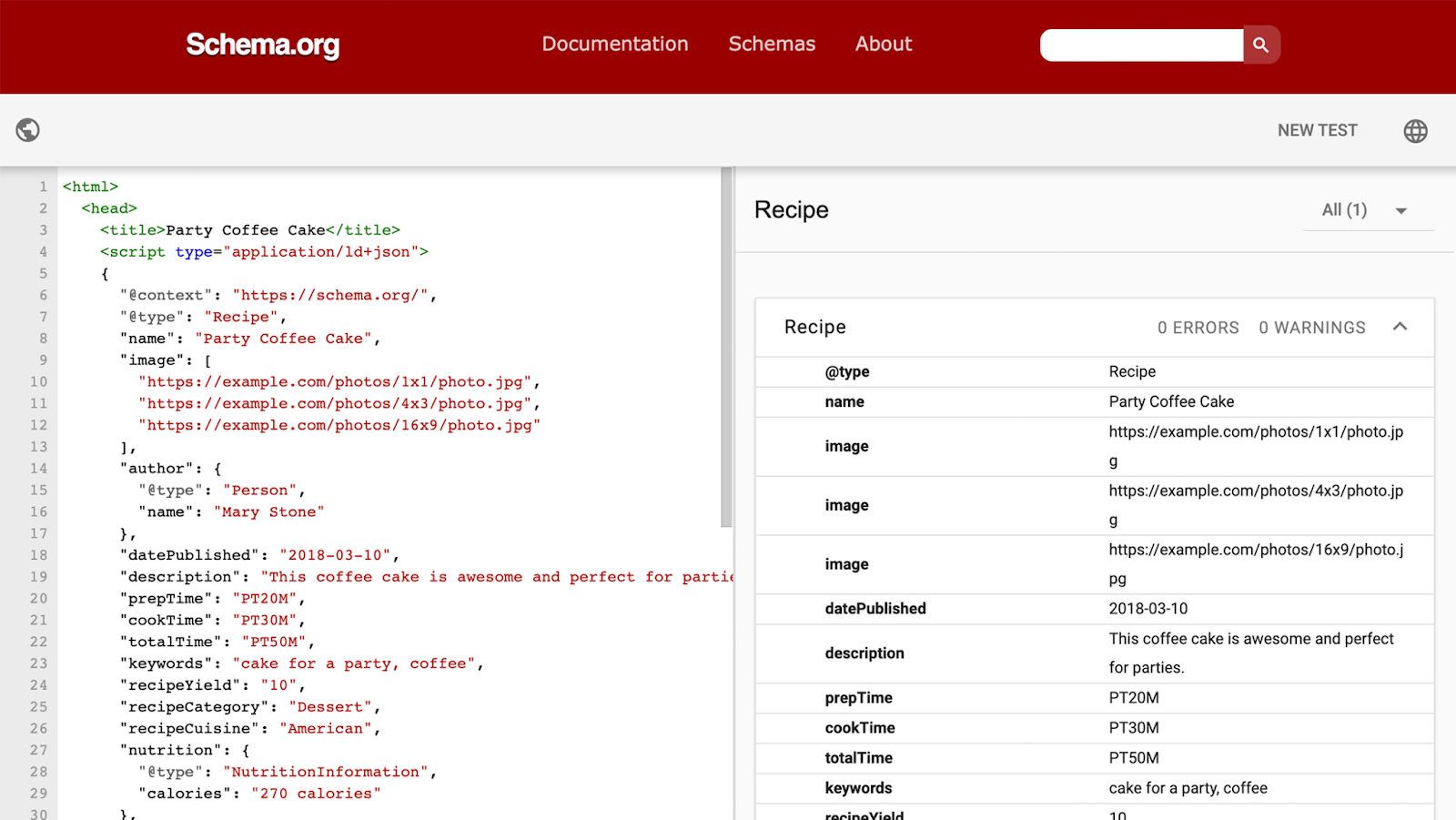
Google uses structured data to understand the context of your content. You can use Google’s schema markup testing tool to locate any gaps in your structured data.
a) Researching keywords
Keyword research is the first step of your on-page SEO approach. You can never go further unless you know what keywords to target. Most of your on page SEO and keyword targeting efforts will be done through your blog posts. You can use tools like Semrush to find keywords that have an average search volume and low competition.
b) Thin Content
According to Google, thin content refers to content that provides little value; such as scraped content, doorway pages, and AI-generated content. The core factor Google focuses on when judging any type of content is the “value.”
To avoid getting your content labeled as thin content, you have to make sure your posts satisfy the following criteria:
The information you provide always needs to be detailed and accurate. Whatever you promised the reader in the headline must be delivered by the time they finish going through the content.
The ultimate goal for Google is to help the end user find the information they were searching for. Your content needs to answer the user’s questions and confusions by providing them with the knowledge they were looking for when they searched using a specific keyword.
The information you provide needs to be well-organized with clear headers, bullet points, images and other visual media. What about AI-generated content? Well, Google won’t derank or penalize you for AI-generated content if it provides real value.
c) Keyword positioning
In quality content, primary keywords and related LSI keywords usually integrate throughout the content naturally. However sometimes you need to strategically place your target keywords in certain parts of the content.
Here is where your primary keywords should be placed:
d) Pictures and images

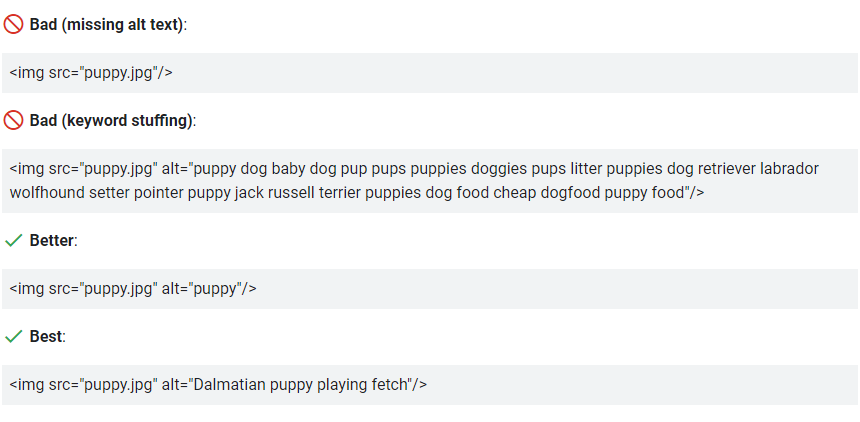
Pictures and images are an essential part of on-page SEO. They are a major factor when it comes to ranking since they help increase user engagement and the time they spend on a page, which is another ranking factor.
Find the right balance between image quality and file size. Try to compress the images without decreasing the quality with tools like Adobe Photoshop, TinyPNG, and ImageOptim.
Google uses alternative texts for an image to understand what the image is about. Don’t forget to add your keywords to the alt texts.
The image you upload should also contain your target keyword(s) in its file name. Always use dash or underscore to indicate space in the filename because otherwise it’ll be replaced with “%20,” which won’t look trusted at all. This will also negatively impact the ranking of your image in Google image’s results page.
e) Meta titles and H1 tags
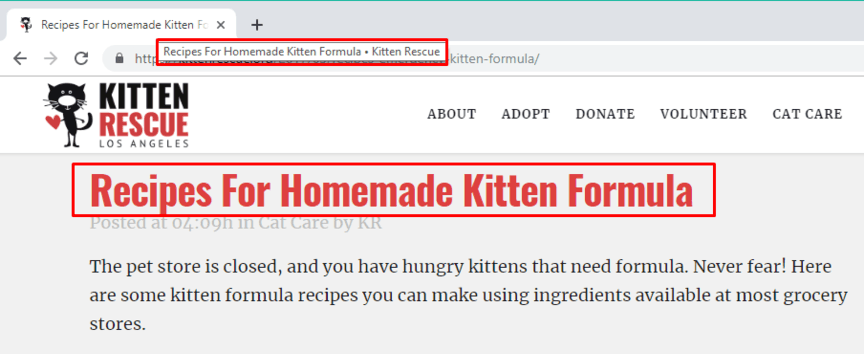
Note: Meta titles and H1 tags can be the same as each other, but it’s always safe to keep two different options. A click-worthy title is mandatory for on page SEO as it affects the number of clicks you receive.
For example, “ 5 Exercises You Must Try Today!” doesn’t create much value for the reader. However, a title like “5 Exercises that Can Reduce Insomnia” gives the reader a reason to spend time reading your content.
For example, a title like “Plumbing Services” might get lost in Google’s algorithm. To make it more favorable, you can choose the title “Affordable Plumbing Services 2023”
f) Headers

Headings help organize the information you provided into digestible sections. They also help Google understand the hierarchy of your page. However, it doesn’t recognize headings through font size like humans as it sees the entire content in an HTML format.
g) Meta description
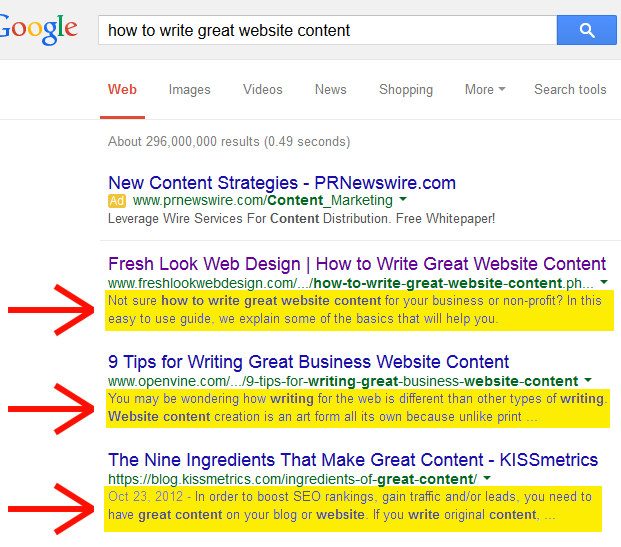
The description that appears under the title tag on SERPs is called the meta description. It tells searchers online that your page and its content will answer whatever they searched for.
The meta description is also what you see in preview snippets on social media. Sometimes Google decides not to use the meta description you added and instead makes its own description based on the content and query. This is why it is important to use heading tags properly.
h) URL
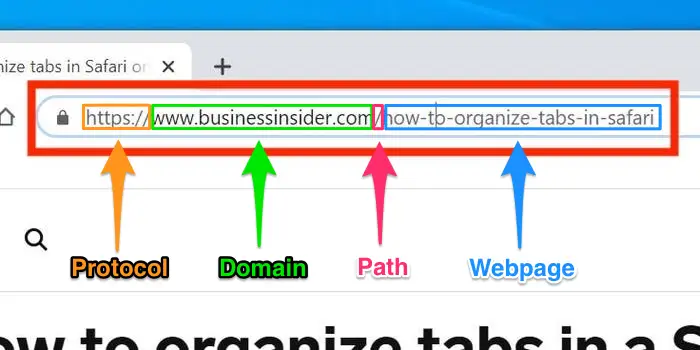
Almost all content management systems (CMS) have the ability to auto generate URLs for your web page. Sometimes the system generates a random set of numbers as a URL that you’ll need to edit appropriately.
a) Analyzing your backlink profile
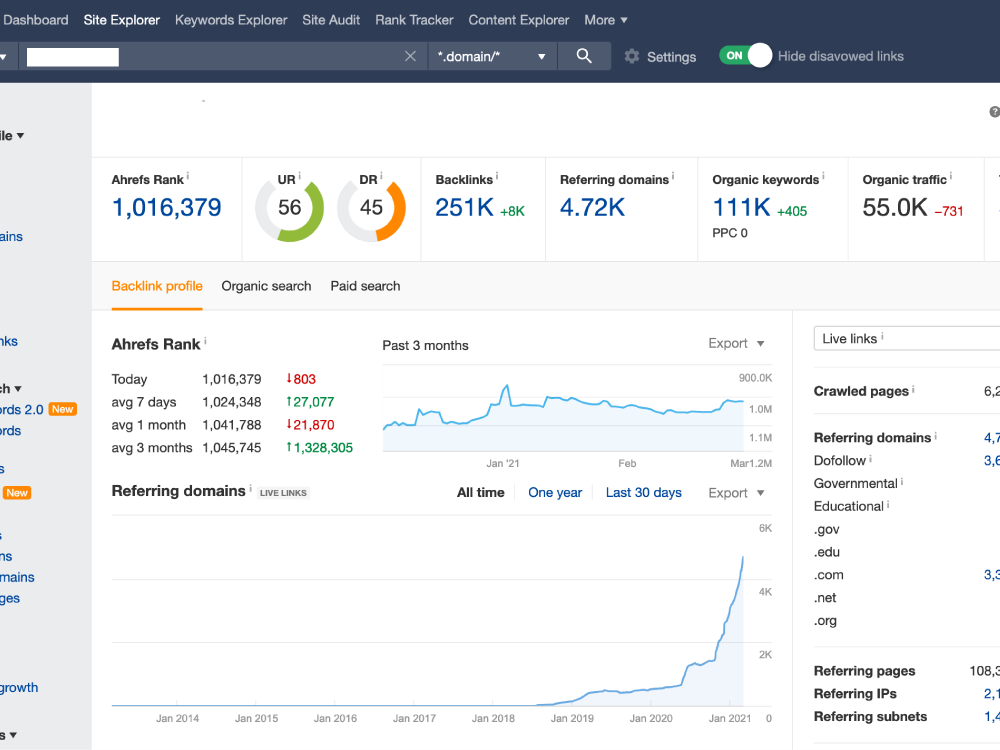
All the inbound links that direct to your site from other websites make up your backlink profile. They are important parts of off-page SEO because Google sees these links as indicators of value, authority, and credibility for your website.
Tools like Ahrefs, Moz or SEMrush can be used to check how strong your backlink profile is. They provide insights and analytics such as the sources and their authority, the number of links and anchor text distribution.
All backlinks are not equal. Only relevant links from authority websites will add value to your site while links from spammy sources will hamper your reputation. You can use Google’s search console to disavow these links.
A good backlink profile will include links from diverse sources like news sites, forums, blogs and social media.
Anchor text: The blue texts in hyperlinks that you can click are called anchor texts. There needs to be a natural distribution of anchor texts to avoid over optimization. Monitor your link profile and fix any broken backlinks to maintain your authority.
b) Citation
This is any mention of your business name, address or phone number (NAP) on other websites like social media platforms and review sites. Citations are an important part of local SEO.
You have to create a list of all existing citations regarding your website. You can do that faster using automated tools like Moz Local. They will help you find duplicates, inconsistent, and missing citations.
Remember to ensure your NAP information is accurate and up to date because inconsistency will confuse Google and have a negative impact on your ranking.
c) Review
Off page SEO audit also includes auditing online reviews for your website to manage your online reputation and get important customer feedback. Platforms like Google My Business, Facebook and Yelp all give customers a chance to write their reviews on your product/service and business.
Look for any pattern or trend in your customer feedback to understand the strengths and weaknesses of your website. Responding to their feedback promptly will show you care about their feedback.
Learning how to handle negative reviews is also important. It is easy to delete or ignore them, but responding to them in a professional way is the best option.
Try to encourage positive reviews from clients by strategically placing review boxes around your website, software or social media page. Over time, positive reviews will balance out the negative ones and help boost your brand reputation.
d) Local SEO

This is applicable if your website leads to a physical location for your business. First, make sure Google My Business has accurate information about your business like opening and closing times.
Quality images and regular posts will help motivate customers to write comments and reviews. Your job is to reply to their feedback in a courteous and timely fashion.
Next step is to include content that is locally relevant on your website. For example, something as simple as including the name of your city in the meta description, URL and content will let Google know where your target audience is located. You can also take help from local businesses and celebrities to enrich your local backlink profile.
e) Social Media
Social Media itself is not a ranking factor but Google takes into account something known as social signals that can impact your ranking. With social signals, Google analyzes your social media activities like followers, shares, likes, and comments.
A strong and consistent social presence across all platforms will help Google understand your brand and its activities. This will also help you create trust within your target audience and more opportunity to interact with them. More engagement will signal Google that people care about your brand.
a) Google Search Console
You can use Google Search Console to measure things like impressions, clicks, click through rates (CTR), and position. You can also track featured snippets like sitelink, AMP, video snippets, and breadcrumb.
This is a crucial SEO tool that tracks metrics using Google’s personal data and not third party data. It also provides insights on Google’s algorithm updates and site errors.
b) Google Analytics
One of the best tools for tracking overall website performance is Google Analytics. Its robust data gathering system can help you understand customer interaction across your website.
c) Google Trends
One of the most unique tools available, Google Trends lets you see the popularity of a search term across months and years. You can search for any word or phrase and track and compare the relative interest in different topics and gain valuable data for market research, content creation, and trend analysis.
d) Google Mobile friendly test
You can check if your website is ready to be mobile-friendly using this tool.
e) SEMrush
SEMrush has a complete set of tools that can help with your SEO audit. They run 120 checks to find issues with page speed, crawling, backlink, security and on page SEO.
Now, SEMrush services start from $119 per month and go up to $449 per month.
f) Ahrefs
This is another complete set of tools designed to conduct technical SEO audit, content and keyword gap, backlink audit, and more. In fact, Ahrefs is known as SEMrush’s biggest competition.
Ahrefs services start from $99 per month and go up to $999 per month.
g) SEO Pro Extension for Google Chrome
Kristina Azarenko from Marketing Syrup created the SEO Pro Extension for Google Chrome. It helps with evaluating web pages and issues with header tags. It has its own scoring system based on header tags, alt text, images, and page speed.
h) Hubspot website grader
One of the oldest tools used to grade website performance, the score is given on four criteria: website performance, mobile friendliness, search engine optimization, and security
a) Surfer SEO
Content optimization and audit can be performed using Surfer SEO. It also includes keywords research ability and an extension for Google Chrome.
Surfer SEO services start from $50 per month to $119 per month.
b) Page optimizer pro
SEO professional Kyle Roof created this cloud based on page optimization app. It uses analysis based on your top 10 competition. It will alert you whenever your competitors make any changes, allowing you to keep up with them in SERPs and avoid falling behind
Prices start from $27 and go up to $49 a month.
c) SEO minion extension for Google chrome
One of the best tools for on-page SEO audits, SEO Minion analyzes on-Page SEO elements for your website. It can also check internal and external links for broken links.
First, let’s take a look at their benefits:
DIY audits are more cost-effective because you’re not paying for professional services.
You’ll have full control over the audit process if you’re familiar with SEO and the specifics of your website.
Doing it yourself can be a great learning experience. You can gain valuable insights into SEO and your site performance.
You can start making changes and improvements right away without waiting for professional help.
This is great if you have a small website with straightforward SEO needs.
Professional auditors have experience and knowledge – exactly what you need for a more comprehensive and accurate analysis.
SEO professionals can quickly identify issues and provide solutions that you won’t be able to do as a beginner without experience.
They use advanced tools and techniques to uncover hidden issues and opportunities for a more thorough evaluation.
They can create a tailored SEO strategy that aligns with your business goals and industry’s best practices.
Professionals can help you prioritize and focus on the most critical issues to achieve the best results.
Now that you know why SEO audit is important, it’s time to walk the path. If you have a small website, limited budget, basic SEO knowledge, and the time to invest in learning and auditing, you’ll do fine with a DIY audit.
But if you own a large website with complex SEO needs, you better hire a professional. This is especially true for businesses heavily reliant on online traffic.
In some cases, a hybrid approach is recommended where you conduct an initial DIY audit to address the obvious issues and then bring in a professional for a more in-depth analysis.
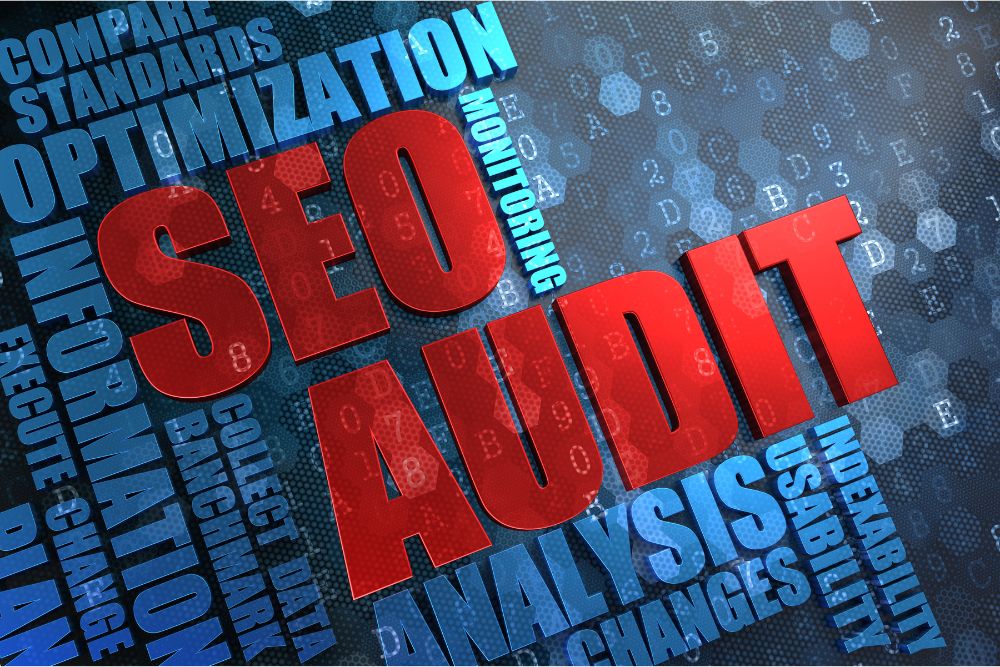
The cost depends on many factors, such as the website size, number of pages, complexity of the code, and more. A general estimate can start from $500 for simple websites and go as high as $30,000 for large websites with high authority and traffic.
Factors that affect SEO audit pricing:
Large websites have more pages and content that need to be audited. This will obviously take much longer to do than a small website that only has a few web pages.
Clients can choose between partial audits and complete audits for their websites. Complete audits are always recommended as they reveal all the issues that harm your ranking.
For instance, you may believe that technical issues alone are preventing their ranking capabilities and go for a technical SEO audit only. In that case, all the on-page SEO issues will remain under the radar and your ranking problems will continue.
Websites with complex coding and content issues will cost more than usual because it will take a lot more time and effort to audit properly.
Most SEO audits take a few days or few weeks to complete, depending on the size and the existing issues.
A simple technical SEO audit for a small site can be done in 2 to 3 days, whereas an in depth SEO audit of a larger website with a complicated CMS (content management system) will take around 2 to 3 weeks.
Experienced SEO agencies will always charge more than a new one because of their years of valuable experience. Even if you have to pay more, the service you will get should be more than enough to make up for it.
SEO audits are a great way to find the issues present in your website that are stopping you from getting positive ranking, traffic, and sales. In this article, we have tried to cover everything there is to know about why SEO audit is important.
If you cannot run an SEO audit yourself, you’ll need professional help from a dedicated SEO audit agency like LinkBuilderPros. We can provide valuable insights that will guide your strategic decisions to achieve your online goals.
You will need an experienced partner that you can trust. Here at LinkBuilderPros we offer complete SEO Audit services using white hat techniques only.
Get in touch with us to learn more about our services so we can discuss further and help your website get the ranking it deserves.
Q. How often should I do an SEO audit?
Ans. Large websites should perform a technical SEO audit once every six months. However, you should audit immediately after a major change in your website e.g. after upgrading to a new hosting service.
Q. What to do after an SEO audit?
Ans. The audit report will reveal valuable insights about your website – its current issues, how to fix them, and recommendations for optimization. So, make a plan (better if already provided by the auditor) and implement all the recommendations to improve its performance.